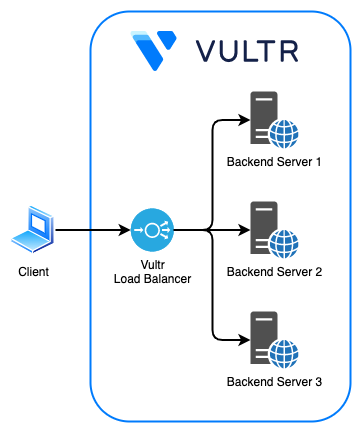
Introduction
The Vultr load balancer solution allows you to distribute your application's workload across multiple servers depending on the configured algorithm. As a result, this software architecture is suitable in scenarios where you need to increase the reliability and capacity of your applications.
In this setup, client applications connect to the Vultr load balancer, which routes traffic to the backend servers, as illustrated in the following diagram. The backend can be a database server, a web server, or an API.

Load balancing is a core network solution for modern applications. This guide focuses on the different benefits of implementing the Vultr fully-managed load balancer in your applications.
Benefit 1: Horizontal Scaling
If you're expecting unusual traffic spikes in your application, a single backend server may not get the job done. In this case, you need to deploy multiple servers depending on your application's workload.
For instance, assume a single server can handle 1,000 parallel connections, and you're expecting 10,000 visitors in peak hours. In that case, you need to deploy 10 servers to handle the growing needs of the clients' requests. To distribute traffic across the servers and offer horizontal scaling, this is where the Vultr load balancer comes into play.
Benefit 2: Better Load Distribution
The backend servers in a modern cloud computing cluster might have different specs (for instance, RAM and CPU), and they may not be able to handle the load equally. Also, some clients' connections may remain tied up for a long time in some of the backend servers. The Vultr load balancer is a good candidate for distributing the load evenly across the servers.
Vultr uses the least connections and round-robin algorithms to route traffic, making the overall data processing more efficient. This is a good way to optimize your application's response time while avoiding uneven overloading to the servers. In the end, this results in a better user experience for your applications.
Benefit 3: Security and Redundancy
A mission-critical application with a single point of failure (SPOF) is very risky in any business setup. Distributing your data across different servers provides redundancy. The distributed software architecture works as a backup if something happens to one of your backend servers, for example, the database files.
The Vultr load balancer allows you to deploy and connect multiple servers to offer a high level of security. Also, it supports the HTTPS protocol to provide encryption between the clients' applications and your backend services.
Benefit 4: High Availability
As your application grows, you should avoid any chances of downtime because this can lead to poor customer experience and loss of revenue. By implementing the Vultr load balancer in your application, you can distribute clients' requests to the rest of the servers in a cluster if some servers fail or become unresponsive. This provides high availability to your applications, and your services can operate when and as needed.
Benefit 5: Flexible and Economical Solution
The Vultr load balancer is a fully managed service. It reduces the overall maintenance costs associated with your application. You don't have to maintain expensive IT experts to manage the load balancer. With as low as $10 per month, you can deploy a load balancing solution that suits your business needs.
Also, deploying your application across different servers allows you to service the application's backend without bringing your entire system down. For instance, if you have ten backend servers and want to service three servers, you can stop them, update them and bring them up again. Your application will continue serving clients' requests during this maintenance process without any problems.
Conclusion
While this is not a conclusive list of the benefits of using the Vultr load balancer, you can see the technology has many advantages. Therefore, you should consider deploying it if you want scalability, optimal load distribution, security, high availability, and a flexible, economical solution for your application.
For more information about the Vultr load balancer, visit the following resources.
No comments yet.